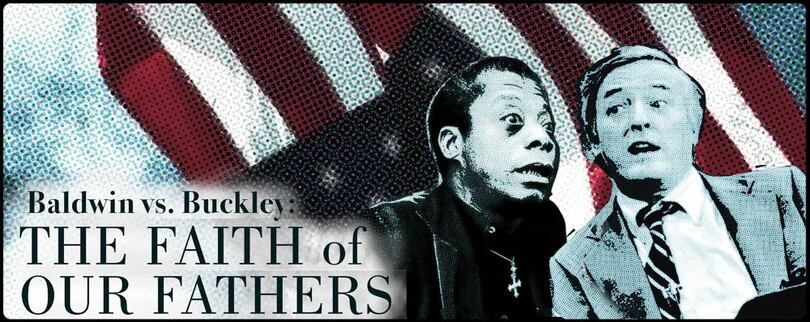Syracuse Stage opens its fall 2021 theater season with ‘Baldwin vs. Buckley’

Courtesy of Syracuse Stage
The play is by Syracuse Stage’s first resident playwright Kyle Bass, who said that though the debate happened in 1965, it is just as relevant today.
Get the latest Syracuse news delivered right to your inbox.
Subscribe to our newsletter here.
On Friday and Saturday at 7:30 p.m. the theater will perform “Baldwin vs. Buckley: The Faith of Our Fathers” as its first in-person show since the pandemic began. The free production, adapted by Syracuse Stage’s first resident playwright Kyle Bass, is a theatrical reading of the famed Feb. 18, 1965 debate between writer and civil rights activist James Baldwin and conservative commentator WIlliam F. Buckley Jr. at Cambridge University. The debate’s topic was “The American Dream is at the expense of the American Negro.”
Unlike the 1965 audience, attendees at Archbold Theater will be required to wear masks in accordance with COVID-19 protocols. Proof of vaccination or a negative test is also required. More information, as well as ticket purchases, are available on Syracuse Stage’s website.
Syracuse Stage resumed in-person shows with “Baldwin vs. Buckley: The Faith of Our Fathers” to feature a work by the theater’s first resident playwright and because it’s a timely and powerful production, Artistic Director Bob Hupp said.
“Everyone’s talking about it now because Baldwin was right — he was prophetic,” Bass said. “I hope what students take away is sort of the … expression of the mind, soul, thinkings and passions of both these men.”
The original Baldwin-Buckley debate, which the former won, has since only gained power and relevance, Bass said. Although he doesn’t want to dictate what audiences take away, he imagines some will be surprised it’s revived from 1965 because the conversation between two brilliant men with opposing views on race in America still feels like a current topic.
Bass has always admired Baldwin’s writing and appreciated Buckley’s strength as a speaker, even though he did not agree with Buckley’s views. The script began in 2016 as a personal exercise of transcribing the debate word-for-word before Bass decided to turn it into a theatrical production later that year, curious how modern actors would approach playing Baldwin and Buckley. The show has since been performed using Bass’s script at the University of Delaware, Colgate University and by the Civic Ensemble in Ithaca in partnership with Cornell University.
“As a playwright, I was interested in theatricalizing this real event, because on its own as an original event, it had a certain theatricality about it,” Bass said.
I hope what students take away is sort of the... expression of the mind, soul, thinkings and passions of both these menKyle Bass, Syracuse Stage playwright
Although “Baldwin vs. Buckley: The Faith of Our Fathers” is word-for-word to the original debate, for the reimagined version Bass created a prologue and epilogue, added visual projections and music and included other writing, speeches and interviews by Baldwin and Buckley. This was to add depth to both men and create a collage effect, he said.
Stuart Plymesser, the theater’s production stage manager, said these additions take certain parts of the debate into the realm of “what-if.” The projections aid the script, he said, and interweave images from the civil rights movement up to the Capitol insurrection earlier this year.
“Some of them are things that you start to look at and say, ‘Is that an image from the ’50s and ’60s, or is that an image today that just happens to be in black and white?’ And you don’t know,” Plymesser said. “And that’s the thing about the script, is that it’s the same issues.”

“Baldwin vs. Buckley: The Faith of Our Fathers” will be showing for free on Sept. 17 and 18.
Daily Orange File Photo
“Baldwin vs. Buckley: The Faith of Our Fathers” is part of Syracuse University’s Artist in Residency program with Carrie Mae Weems, who Bass said played an “instrumental” role in the production. Under the direction of Godfrey L. Simmons Jr., the cast includes L. Peter Callender as Baldwin, Wynn Harmon as Buckley and SU drama senior Emily Hernandez as the president of Cambridge Union.
Today, the questions posed in the original debate are still needing to be asked, Plymesser said. Following each performance, which runs a little over an hour, there will be a conversation about the historical context and timelines of the debate between Bass, Simmons, cast members and the audience following the production.
“My hope, personally, in us doing the show, is just to keep these conversations moving and to have people who haven’t had these conversations before initiate these conversations amongst themselves,” Plymesser said.





